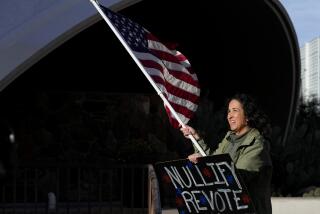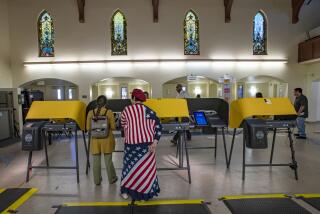Election Workers’ Nightmare
SACRAMENTO — For election officials across America, what’s happening this week in Florida is a glimpse of their own private nightmares.
At conferences and private lunches, these keepers of the ballot share a standard joke: On election day, they feel like inmates who hope to escape the big bright spotlight from the guard tower.
That’s because in any election, glitches inevitably happen. It’s just a matter of whether the snafus get caught.
From balky counting machines to misplaced and mangled ballots, there is a troublesome list of potential pitfalls. Human error often comes into play. Polls can close a tad early or a tad late. Voters who register at the motor vehicle department might later find themselves left off the election rolls.
Problems with individual ballots are mostly few, far between and lost in the crush on election day. America, despite this week’s turmoil, is far from an electoral banana republic. Experts estimate that far fewer than 1% of the ballots in any given election in the United States are miscast or compromised.
But when a race grows close--let alone approaches the razor-thin margin separating Republican George W. Bush and Democrat Al Gore in their presidential fight for Florida, and ultimately, the White House--the level of scrutiny rises enormously.
Conny B. McCormack, Los Angeles County registrar-recorder, could have been speaking Thursday for any one of her peers across America: “I’m happy I’m not a Florida election official.”
In the Sunshine State, the big bugaboo is the “butterfly” ballot, which lists the candidates on facing pages. Gore’s name appeared opposite a page listing Reform Party candidate Pat Buchanan, and Democrats say many Gore backers in Palm Beach County mistakenly punched their vote for Buchanan, who got a bigger-than-expected tally in the largely Democratic county.
Deborah Phillips, chairwoman of the Voting Integrity Project, said her nonpartisan organization has logged numerous telephone calls from troubled voters there.
“There is a high level of upset among voters who feel their franchise was violated,” said Phillips, whose organization has traditionally been embraced by Republicans. “One voter said she got a sample ballot in the mail, filled out all the little circles, then took it to the polls. It wasn’t until she saw the discussion later in the news that she realized she had picked the wrong circle.”
Election experts say the butterfly ballot has been discredited in many parts of the country, largely for the very confusion it seems to have caused in Florida. The last time anyone can recall using such a ballot in California was a 1990 San Diego County election.
McCormack, who was registrar in San Diego County before coming to Los Angeles, said the butterfly, which was used to crowd more candidates and issues on a single ballot, caused a high degree of double-punching.
“It was a huge problem,” she said.
Deborah Seiler, a former elections director for the California secretary of state and author of a newsletter for county clerks, said election officials avoid the butterfly ballot “simply because it is difficult to read.”
But the most common irregularity that nudges votes off course in elections all around America is an arcane throwback to the days of computer punch cards.
In election-speak, it’s known as the hanging chad.
The glitch results from the use of the punch-card voting system, to this day the dominant method of casting a ballot in the nation. When a voter punches a small hole for their desired candidate, the bit of paper sometimes fails to dislodge.
That hanging bit of debris is the chad. As the punch card runs through a machine that tallies the totals, the chad can cause the automated reader to assume that no vote was cast in that particular race.
Punch cards, which were used by more than 37% of the registered voters nationwide in the 1996 presidential election, also cause problems when confused folks mistakenly vote twice in a single race.
In such cases, the machine reads it as if no vote is cast. Election officials say just that snafu was the prime culprit in the disqualification of about 19,000 ballots in Palm Beach County after Tuesday’s vote.
McCormack and Seiler called the punch card system ancient and ill-performing, but the system continues to be deployed on election day all around the country because it is inexpensive.
Though some officials predicted that the problems in Florida could be a boost for touch-screen voting, the cost to switch would be huge. McCormack said conversion to touch-screen voting in Los Angeles County, the biggest in the nation, would cost an estimated $100 million. Riverside County spent $13.5 million on such a system.
Hanging chads also explain the boost in vote totals for Gore and Bush as Florida officials conduct a statewide recount. During a second run through the scanning machines, the punch cards tend to lose any chads that might have hung in there for the first go-round. Thus, the vote rises.
Even so, election officials are surprised that Gore was surging ever closer to Bush in the recount. Typically, a recount yields a margin of difference that is nearly identical to the original vote.
But the recount in Florida is a rare event. Statewide second-chance counts are atypical, let alone in the context of a presidential contest.
California election officials, for instance, can’t recall the last time such a second count took place in the Golden State during the modern election era. The only time a statewide recount was even considered--and for only the briefest of moments--was after the 1994 U.S. Senate race when Dianne Feinstein edged out Michael Huffington.
Adding to the mechanical difficulties are the foibles of volunteer poll workers grappling with a system that can veer toward the byzantine.
“Many of the errors are usually human errors,” Seiler said. “There’s lots of room for error.”
In addition, voters sometimes complain about long lines. That particularly was the case this week in New Mexico, Phillips said. Other voters groused that they registered at the motor vehicle department under motor-voter rules but went to the polls to find that they weren’t on the rolls.
More to Read
Get the L.A. Times Politics newsletter
Deeply reported insights into legislation, politics and policy from Sacramento, Washington and beyond. In your inbox three times per week.
You may occasionally receive promotional content from the Los Angeles Times.










